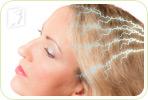The electric shock feeling is one of the least-understood of all menopause symptoms - not only by the average person, but even by many experts. If you feel you might be suffering from it, it's important to seek out as much information as possible to find a treatment method that works for you. Read on to get the answers to frequently asked questions that you may already have.
What Is the Electric Shock Feeling?
Electric shock feeling is a prickling, zapping, or surging sensation that often occurs in menopausal women in the head, chest, or extremities. Though far less common than hot flashes and night sweats, this condition affects a small number of women who are going through menopause. Women may experience symptoms differently, but a few are common to all.
What Causes Electric Shock Sensations?
The exact causes of electric shock sensations remain unknown, as little scientific research exists on the subject. Current data suggests, however, that miscommunication between the nervous and endocrine systems could be to blame - especially among menopausal women, who suffer from decreasing levels of estrogen. Estrogen plays a critical and complex role within the brain.
Other possible explanations are related to the loss of bone density caused by osteoporosis, which can eventually damage nerves in the spine; the misfiring of neurons in body tissue; and certain medications, particularly those used to treat hot flashes, among other conditions.
What Are the Warning Signs?
Unfortunately, there is still no way to know when an episode of electric shock will strike, as the sensation is known to come on quickly and without warning. The first signs, however, tend to appear in women during the perimenopause period, or the transitional stage from fertility to the complete cessation of periods. Additionally, those who feel electric shocks sometimes experience them as a precursor to hot flashes and can use them as a warning sign for an impending episode.
What Does it Feel Like?
Reports vary depending on the individual, but the most common symptoms of electric shock include a zapping feeling on the skin and a surging impulse between the skin and muscle tissue underneath. These feelings generally last a short while - just a few seconds - but they can be quite uncomfortable nonetheless. Intensity levels also differ from person to person, ranging from slightly bothersome to extremely distracting.
Is it Treatable?
There are many suggestions available for managing and treating electric shocks. The simplest and easiest way is to make lifestyle changes toward a more balanced diet and regular exercise routine. For example, eating foods like fish, eggs, broccoli, and walnuts - which are rich in omega-3 fatty acids and magnesium - could make a difference.
If these modifications aren't enough, sometimes natural herbal supplements can make a difference by balancing out hormonal levels. Medication may also be a viable option, but they should be reserved for severe cases and as a last resort.
Understanding as much as possible about the feeling of electric shock is the best way to find relief from symptoms, as well as peace of mind. Armed with the above information, talk to your doctor today about what you can do to reduce or eliminate these episodes from your life.
Sources
- National Institutes of Health. (2009). Omega-3 Supplements: An Introduction. Retrieved September 16, 2013 from http://nccam.nih.gov/health/omega3/introduction.htm
- United States Department of Agriculture. (2004). Lack Energy? Maybe It's Your Magnesium Level. Retrieved September 16, 2013 from http://www.ars.usda.gov/is/ar/archive/may04/energy0504.htm?pf=1


